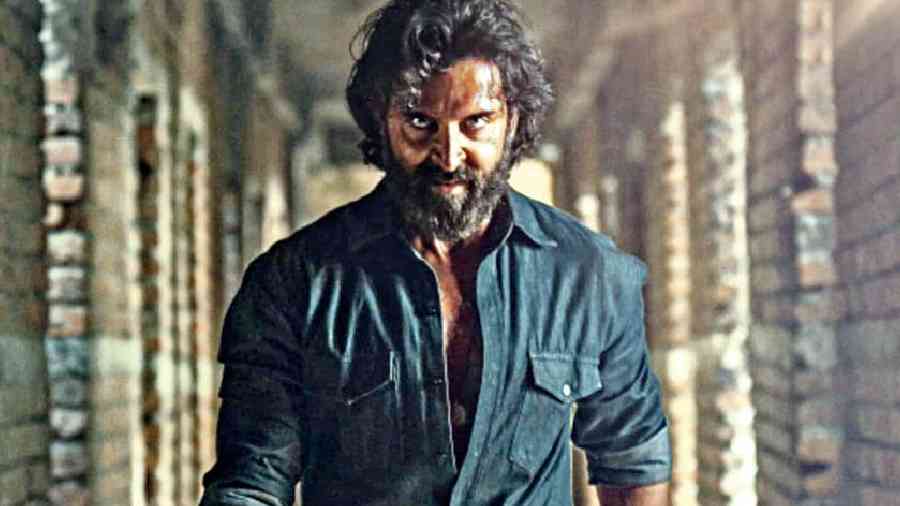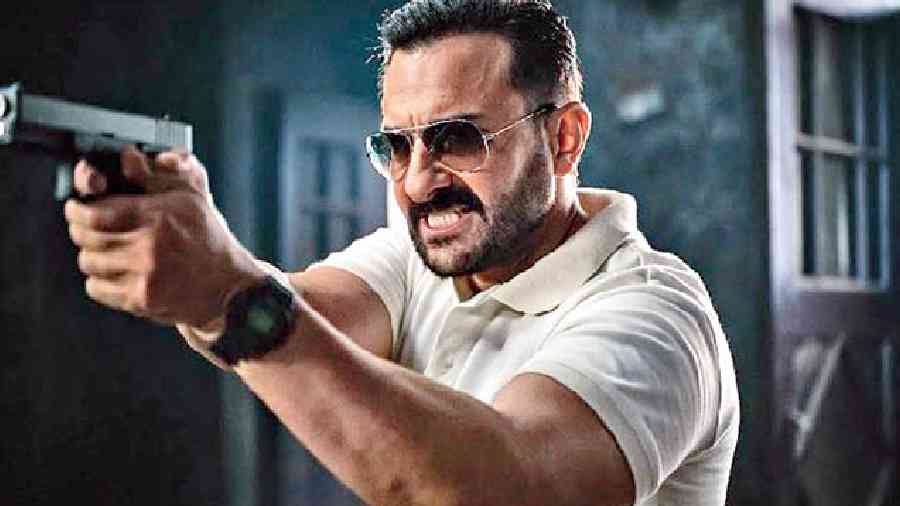The notion and definition of black and white is constantly challenged in Vikram Vedha, a film that subtly but succinctly examines the ever-shrinking chasm between good and evil, and over the course of two hours and quite a bit more, gently pushes and then provokes us to realise that it is the grey that often overpowers what is black and white. Like life, which is about the beginning and the end, but also about what is in the in-between.
Directors Pushkar & Gayatri adapt their 2017 Tamil film Vikram Vedha, transposing the action from Chennai to Lucknow, but keep the rest of it faithfully adherent to the original. They fashion a rare massy entertainer that packs in a message and also keeps the viewer guessing, as its eponymous protagonists engage in a feverish game of cat ’n’ mouse, starting off on opposite ends but gradually finding themselves sliding over to the others’ side, until what is good and what is evil becomes a blur.
That cops and criminals are two sides of the same coin is a theme that has been explored in cinema often enough. Michael Mann’s Heat, starring Al Pacino and Robert De Niro, is an effective exploration of how a cop’s life and career could be more more messed up than the gangster’s he’s up against. Such is the case with Vikram — Saif Ali Khan slips into the part played by
R. Madhavan in the original — an encounter specialist who is parachuted into a special task force in Lucknow that has been set up with the single-minded goal of obliterating a dreaded criminal named Vedha, with Hrithik Roshan embodying the part played by Vijay Sethupathi in the Tamil film like second skin.
Vikram Vedha starts off with an encounter, planned to a tee by Vikram, along with his motley crew of cops, including close pal Abbas (Satyadeep Misra). Even as some of his colleagues hesitate in taking out some men who are unarmed, Vikram has no such scruples. He points out, “We are the good guys”, and claims that he sleeps soundly at night because he knows he hasn’t ever killed someone innocent. Until the day Vedha casually walks into the police station, gives himself up and then proceeds to tell Vikram a story that slowly but surely starts unravelling the latter’s predetermined ideas of right and wrong.
Dilemma — ethical, moral, social — lie at the heart of Vikram Vedha. A large part of it has its roots in the mythological tale of Vikram and Betal where the ghost Betal, epitomising evil, always succeeds in putting king Vikram in a moral dilemma after telling him a story that challenges the ethical mores the monarch has always believed in. In Vikram Vedha, Vikram’s moral dilemma is not only limited to his place of work... it also seeps into his relationship with his wife — Radhika Apte plays Priya, like Shraddha Srinath in the original — who, as a lawyer, takes up Vedha’s defence.

Hrithik Roshan
An action film plotted in the form of a whodunit, Vikram Vedha, despite its running time of 160 minutes, manages to keep the audience engaged because it doesn’t simply play out as a gangster drama. Yes, gangster film cliches abound like they did in the original, but one can easily look past that because this is a genre-bender film that seamlessly blends heavy-duty action with conversations that often touch upon the philosophical.
Even as they continue to come face to face and Vedha keeps tossing one story after another at Vikram, the viewer is taken on a ride replete with both intrigue and energy, where masks are ripped off and loyalties are tested.
Despite its grim theme, Vikram Vedha is a rare cop-vs-criminal film whose frames are always arresting. Whether it’s Vikram and Vedha engaging in a pow-wow in the rain or an action sequence played out in a field, where the slo-mo kicks and punches are choreographed to the evergreen Mukesh hit Kisi ki muskurahaton pe ho nisar. The architecture, and more importantly, the street food of Lucknow lend Vikram Vedha a visual texture that contribute not only to cinematographer
P.S. Vinod’s frames but also to the story.
Even when he was throwing away crowd-pleasing lines, Vijay Sethupathi didn’t need to be a hero. Casting Hrithik Roshan in the same role, by default, necessitates that the actor dominate every frame that he is in. If Sethupathi’s turn was tempered by the facade of a simpleton pulling off the sly and sarcastic, Hrithik’s more larger-than-life image demands that he stride across the screen with as much personality as he puts into his signature nimble moves. Alcoholia, a pedestrian number made watchable only by Hrithik’s energy and expressions, is a perfect example of what he brings to Vedha —darkness but also a certain playfulness, casual brutality but also a teasing tone. The greys, in his hair and his unkempt beard, which first showed up in War three years ago, add to the magic and magnetism.
It is to Saif Ali Khan’s credit — as it was to Madhavan’s in the original— that he succeeds in providing meat and meaning to a less showy part. The creases on Saif’s brow perfectly express Vikram’s increasing moral dilemma. When they first meet, Vikram is in white, Vedha in black. The sparkling conversation about dharma and dharam sankat, moh and maryada between the two, with a table separating them, remains one of the film’s most memorable moments. By the end of the film, Vikram moves on to wearing grey, encapsulating the shift in his thought and eventually in his action.
“The devil is in the details,” Vikram says at some point in the film. Pushkar & Gayatri manage to express that throughout the length of Vikram Vedha, where no detail shared is a throwaway line, no conversation is just a filler... everything is meant to add up in the end. And it does.
‘Yeh kaala kya yeh safed kya, dono mein bhed kya’, goes CS Sam’s pulsating score, with the ‘Vedha theme’, replicated from the original, staying with you long after the curtains come down. So does that money shot of Vikram and Vedha running together and pumping bullets in tandem at a common enemy, one now indistinguishable from the other. For as they say, there is always some bad in the good and some good in the bad.
I liked/ didn’t like Vikram Vedha because... Tell t2@abp.in











